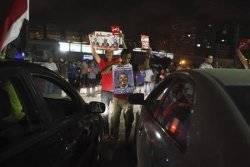Thousands gather for rival rallies in Egypt
30/06/2013| IslamWeb
Egypt braced for mass protests on Sunday as pro- and anti-government protesters gathered in the capital on the first anniversary of the inauguration of country's first democratically elected president.
Thousands of people opposed to President Mohamed Morsi have already gathered in Cairo's Tahrir Square calling for him to resign, while the president's supporters have vowed to defend his legitimacy to the end, leading to fears of confrontation.
Morsi supporters held their own rally outside a Cairo mosque on Friday, an effort to preempt Sunday’s demonstrations, and thousands of them are holding an open-ended sit-in.
The anti-Morsi protests are being organized by a grassroots campaign calling itself Tamarod, meaning "rebellion" or "insubordination", which claims to have collected signatures from 22 million Egyptians demanding the president’s ouster.
The signature drive has no legal standing, but it has nonetheless tapped into widespread public anger towards Morsi. The president has made a number of controversial decisions since taking office, most notably a November decree which
shielded his decisions from judicial review.
Egypt's economy is in free-fall: The pound has dropped in value by nearly 20 percent since Morsi took office, foreign investment continues to dry up, and businesses are paralyzed by widespread fuel and electricity shortages.
Human rights abuses remain widespread, rights groups say, with Morsi's administration doing little to rein in the notoriously brutal security services.
"We gave him the confidence to give us a new programme, to correct what Mubarak had done to Egypt, but he didn't do that. So we have the right to withdraw the confidence that the Egyptian people gave him," said Eman el-Mahdy, a spokesperson for the Tamarod campaign.
"The same Egyptian people have the same right to withdraw this confidence."
Calls to resign
Morsi’s supporters liken the calls for his ouster to a coup, arguing that the only way to remove him is through new elections. They carried signs at Friday’s rally insisting that the president’s "legitimacy is a red line".
"If we are saying that we have a majority, and the opposition are saying that they have a majority, how can they decide," asked Nader Omran, a spokesman and adviser to the Freedom and Justice Party - the political wing of Muslim Brotherhood.
"What is the other solution for this dilemma, except the ballot box?"
Tamarod campaigners have vowed to continue their protests until Morsi resigns, but it remains to be seen whether they can sustain their momentum after Sunday.
Even if the protests draw large crowds, the calendar might work in Morsi’s favor: Brutally hot Cairo days are hardly conducive to protests, and the dawn-till-dusk Ramadan fast, which begins around July 8, will discourage public demonstrations.
Even if Morsi did step down, which seems unlikely, it remains unclear who could replace him. Campaigners have called for a transitional government that would draft a new constitution and then hold new presidential and parliamentary elections.
Role of the military
The campaign itself has also split over the role of the military, which ruled Egypt for nearly 18 months after Mubarak stepped down. Some organizers have urged the army to step in to provide security, a move interpreted by other activists as a tacit call for a coup against the president.
General Abdel Fattah al-Sisi, the defense minister, said in a statement last week that the army has tried to stay out of politics since Morsi’s election, but warned that it has a duty to "prevent Egypt from slipping into a dark tunnel of civil unrest".
There are widespread fears that Sunday’s protest could end in violence. Clashes have spread across governorates outside the capital in recent days, with four Brotherhood supporters having been killed in various attacks on the group’s offices, and two people killed in fighting in Alexandria on Friday, including a US citizen.
Amid the growing unrest, tanks and other military vehicles have started to appear on the streets of Cairo. Still, the period of military rule tarnished the army’s image, and analysts say the generals have little desire to retake power.
"They don’t want to be involved," said Hisham Hellyer, a Cairo-based scholar with the Brookings Institution. "If they’re pushed to be involved, it will be because of violence and social disorder, or the threat of it taking place."
PHOTO CAPTION
Volunteers from the opposition "Rebel!" movement, carrying a crossed-out picture of President Mohamed Morsi and banners reading "Get out", stop traffic to campaign for a major protest during the day, in Alexandria June 30, 2013.
Aljazeera

